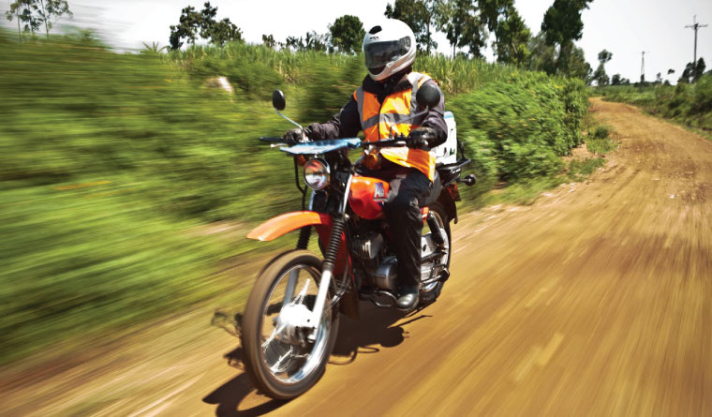
Riders for Health, a social enterprise working in sub-Saharan Africa, is facing a crossroads that’s common across the social enterprise board, says co-founder Andrea Coleman.
Does the organization pursue directions in favour of “always covering the costs of our work, or, to what extent do we choose options where our work will save lives, but where we might not be able to cover the costs?”
|
The referenced media source is missing and needs to be re-embedded.
|
|
| Motorcycles continue to be a vital element in ensuring health-care access in the most remote parts of the African countries Riders for Health now serves. |
Attending the Oct. 2-4 Social Enterprise World Forum in Calgary, Alta., Andrea says she realized every social enterprise is facing some form of this difficult tension.
“As social entrepreneurs, the majority of us are involved in improving fundamental parts of societies; whether it is health care, education, water, electricity, transport,” Andrea says. “We were driven to do this because we became aware of a status quo that needed changing. That is fundamental.”
While she leans in favour of doing the work that has humanitarian value, — even though it may not pay right now, — Andrea says it’s important to “always be looking for who should cover that cost in the long term – whether that be governments, local authorities, business or communities – and be relentless in changing their mind, in showing them the value.”
“This will take time,” she adds.
“Money is short, and neglected issues are the hardest to find money for at the best of times.
“But when we show that our approach works, we are proving that social enterprise is the best way to make the change that we all want to see.”
Established in the late 1980s, Riders for Health is overcoming a major hurdle to health-care access in the most remote parts of the continent – vehicles that don’t work.
It’s common for health-care providers working in remote areas to have their own ambulances, motorcycles and other vehicles, many of which have been donated. But when those vehicles break down, the current system in these remote areas hasn’t typically included people and organizations who know how to repair them, says Andrea.
Riders for Health, which now operates in seven countries across Africa, is filling that gap through its social enterprise model – though it didn’t use the social enterprise language until someone told them that’s what they were, Andrea says with a laugh.
Charging a “not-for-profit” fee to maintain its programs, Riders for Health repairs, maintains and manages more than 1,300 vehicles – motorcycles, four-wheeled trekking vehicles and ambulances – on behalf of its health-focused partners. It also provides training to build local capacity and currently employs more than 300 local people.
Riders for Health reports it has improved access to health care for 12 million people across Africa.
You can comment on this story below, or e-mail michelle(at)axiomnews.ca.
A version of this article was originally written for the Enterprising Non-profits Canada news service. This repost, for which we received permission, follows the style guidelines of the original post. To learn more about generative newsroom options for your organization or community, please contact peter(at)axiomnews.ca.





